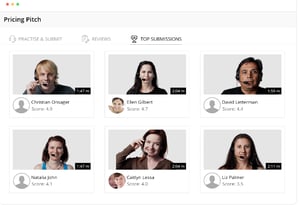The Real Reason Sales Role Play Fails—and How AI Role Play Fixes It
Yesterday, I hosted a live sales training call with a client’s sales team.
7 min read
![]() Dan Fisher
:
Feb 26, 2018 2:56:49 PM
Dan Fisher
:
Feb 26, 2018 2:56:49 PM

“How many new business development sales meetings did you go on last week?" "How many new business development sales meetings do you have  scheduled for this week?" "Dan, you need to schedule more sales meetings with new prospects."
scheduled for this week?" "Dan, you need to schedule more sales meetings with new prospects."
Sound familiar? If you're a sales professional responsible for new business development in which you sell IT staffing services I'm sure you can relate. And if you're a sales manager, I'm sure you're thinking to yourself "how can I get my sales reps to attend more sales meetings with new prospects?"
Having worked with hundreds of IT staffing firms across the country, I don't think there is such a thing as scheduling and attending "enough" initial sales meetings with new prospects. Everywhere I go, and everyone I speak with from within the industry is obsessed with getting more face time with new prospects. And why shouldn’t they, were in sales and this is what we do!
In this blog post I'm going to share with you how best of the best execute initial sales meeting.
Before I highlight what top performers do differently in their initial sales meetings, I want to share with you three interesting observations I've made regarding IT staffing firms and their quest for getting and executing initial face to face sales meetings.
Download Now: Top Sales Prospecting Techniques That Book More Meetings
But forget about my observations, let’s look at some hard factual data. According to Forrester Research, only 19% of the more than 400 US-based IT and Executive Buyers surveyed believe that their time spent with sales people (in a meeting) is valuable and lives up to their expectations.
It seems to me there is a disconnect, but where? I believe the disconnect is tied to the criteria or standard that IT staffing sales professionals are being held to for running the initial sales meeting which leads me to the purpose of writing this blog.
How “Best of the Best” Execute Initial Sales Meeting
Remember, top performers don’t attend the most meetings. What makes them a top performer is what they accomplish in those meetings. Here is how the “best of the best” prepare for and execute the initial sales meeting.
Preparation
Top performers ask themselves the following questions and write down their thoughts, answers and plans on paper.
Key Takeaway: Create a sales meeting preparation checklist to help you prepare for and get organized for all of your face to face sales meetings. Fully embrace and adopt the utilization of your checklist before attending any sales meetings. A few days before (any) sales meeting review your checklist with your sales manager to make sure you haven’t left anything out. Ask your sales manager to test you by trying to “poke holes” in your plan. See if they can knock you off your game. For sales managers, you just want to make sure your business development reps actually took the time to properly prepare. The difference between a top performer or “best of the best” and average performers is that top performers take the time to prepare for their sales meetings, every time.
Opening the Meeting
Top performers take the time to plan out exactly what they will say to open the meeting. They practice rehearse what they will set to frame the conversation and set expectations regarding what topics will be discussed, what decisions will be made and how much time is required. Below are few best practices for how top performers prepare for how they will open a sales meeting.
 Key Takeaway: Top performers aren’t born with magical powers or natural ability of knowing how to open a sales meeting. They learn how to do this through training and/or experience and then they practice. For every initial sales meeting you attend, practice role playing exactly what you will say to open the meeting five times. Ask your supervisor to play the role of the customer and a peer to observe and provide feedback. Do this until you’re “conversation ready” or unconsciously competent.
Key Takeaway: Top performers aren’t born with magical powers or natural ability of knowing how to open a sales meeting. They learn how to do this through training and/or experience and then they practice. For every initial sales meeting you attend, practice role playing exactly what you will say to open the meeting five times. Ask your supervisor to play the role of the customer and a peer to observe and provide feedback. Do this until you’re “conversation ready” or unconsciously competent.
Transition To a Business Conversation
Key Takeaway: For every initial sales meeting you attend, practice role playing exactly what you will say to transition your opening into a business conversation eight times. Ask your supervisor to play the role of the customer and a peer to observe and provide feedback. Do this until you’re “conversation ready” or unconsciously competent.
Discuss Business Issues, Uncover Latent Pain and Admitted Pain
Top performers prepare for what they will say to uncover latent pain and admitted pain in their sales meetings. They do this because they know and understand that new business development and building a sales funnel is all about uncovering customer pain points. You can't build a sales funnel without uncovering customer pain. Top performers prepare for this by doing the following:
Key Takeaway: Top performers don’t go into sales already knowing how to facilitate a discussion on a customer’s key business issues. They’re taught how to do it and then they practice rehearsing the conversation including the questions they will ask and the comments they will make via role play. For every initial sales meeting you attend, practice role playing exactly what you will say to uncover and discuss business issues with a prospective customer five times until you’re “conversation ready.” Ask your supervisor to play the role of the customer and a peer to observe and provide feedback.
Closing The Meeting
Top performers understand that the true barometer for measuring the effectiveness of a sales meeting is based on whether or not the customer commits to a follow up action item such as committing to a follow up meeting, facilitating an introduction or signing the MSA. Top performers plan for the following.
Key Takeaway: Top performers have learned through their personal experience and training that there is a right way and wrong way to closing a sales meeting. To avoid stalled sales cycles and keep their sales opportunities moving forward they constantly practice how to close a sales meeting.
For every initial sales meeting you attend, practice role playing exactly what you will say to summarize and close a meeting five times. Ask your supervisor to play the role of the customer and a peer to observe and provide feedback. Do this until you’re “conversation ready” or unconsciously competent.
Conclusion
As you can see, there are many reasons why top performers have far more productive sales meetings than average business development representatives. The question becomes, what is your standard and expectation for how your sales team and your business development reps run the initial face to face sales meeting?
Is the goal to simply do a “meet and greet” with as many prospects as possible? Or, is the goal to execute a sales meeting in which the salesperson positions themselves as an authoritative thought leader who drives demand for him or herself and gets the customer to consider a solution that was never on their agenda and under consideration in the first place? That is how the best of the best execute the initial sales meeting and why they don't need to attend as many sales meetings as average performers do.

Yesterday, I hosted a live sales training call with a client’s sales team.

1 min read
Most staffing firms don’t struggle to scale because their teams aren’t working hard. They struggle because they don’t have a real go-to-market...

In my previous post, How to Prevent Unexpected Contract Terminations, I shared how systemizing consultant and client check-ins at key milestones...